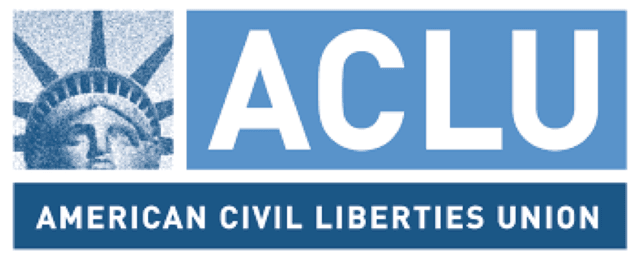Leading the resistance: the American Civil Liberties Union
At this year’s IWITOT (I Wish I’d Thought Of That), Ali Walker of Open celebrated the American Civil Liberties Union and its resistance to Donald Trump’s damaging policies.
- Written by
- Ali Walker-Davies
- Added
- May 16, 2018
The ACLU
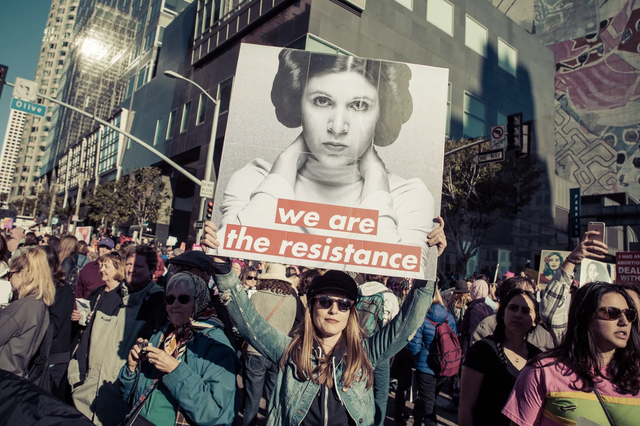
This is the fundraising strategy I wish I’d thought of... and bear with me, because it’s quite a big one. I wish I’d thought of 'leading the resistance'. The one against Donald Trump. The American Civil Liberties Union are leading the resistance against the current president of the USA.
The ACLU was founded in 1920 by a group of self-proclaimed idealists. Their stated goal was to ‘defend and preserve the individual rights and liberties guaranteed to every person by the Bill of Rights of the US Constitution and laws of the United States.
They fight government abuse — whoever is in power — and defend individuals’ rights, like freedom of speech and religion, a woman’s right to choose, citizens’ rights to privacy and so many more beyond.
In the 98 years since ACLU was founded, they’ve amassed an army of 1.75 million members, nearly 300 staff lawyers and thousands of volunteer attorneys at offices across America.
You can imagine, they’re pretty busy these days. But they were prepared. And it’s the story of how they prepared for Trump-ageddon that inspires me and hopefully will give you a little hope too.
Preparing for Trump
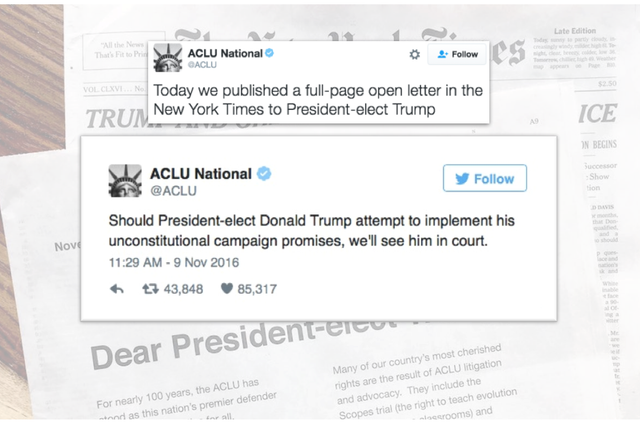
The year the world had enough of experts — 2016 — was a strange one. But luckily the experts at the ACLU didn’t turn their back on the world. Not wanting to put all their eggs in one basket, in Spring 2016 they set about researching the policies of the presidential candidates.
In July 2016, while so many of us were busy laughing at Trump, they published The Trump Memos - a dossier that catalogued every threat that the Donald posed to American civil liberties. It’s a big document.
Then the unthinkable happened: Donald Trump was elected President of the United States, making him — implausibly — the leader of the free world.
The ACLU was ready. The next day it took out a full-page ad in the New York Times and, since we can’t be sure Trump would read a whole page of text, they summarised it in his favourite form: a tweet.
The travel ban
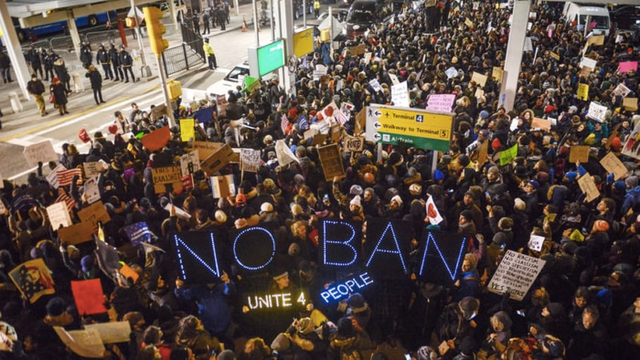
So the battle lines were drawn. Trump would attempt to pass laws that would break the Constitution. The ACLU would be there to resist. It was just a matter of when it would happen and how the ACLU would fight back.
Fast forward to 27 January, 2017. Trump has been in office for one week, and we’re off.
Without any care for the US Constitution, or, frankly, people, Trump signed the first draft of the travel ban, effectively banning the entry of Muslim refugees into the US.
Over 100 travellers in the air at the time Trump signed the ban were denied entry into the US on landing. More than 100 more were turned away from boarding the planes they’d already bought tickets for. Airports were in chaos.
Trump was trampling all over civil liberties, creating a crisis of civil rights and what would be traditionally seen in charities as time to launch an ‘emergency appeal’
So what would the ACLU do?
They could have sent out emails, put out fundraising ads, leapt on this moment to ask for an emergency appeal for money to help fight Trump. Instead they sent lawyers to the airports.
They filed a challenge to Trump’s travel ban, within 12 hours of it being signed. They’d heard a rumour that something was coming out of the White House in the first week. They couldn’t be sure what, but they made sure they were ready to act.
The set up makeshift legal offices inside airports and rallied their legal volunteers to go and offer practical help.
They mobilised people to go along to their local airport and protest. And they blocked the ban, or at least the first.
No fundraising but money comes pouring in
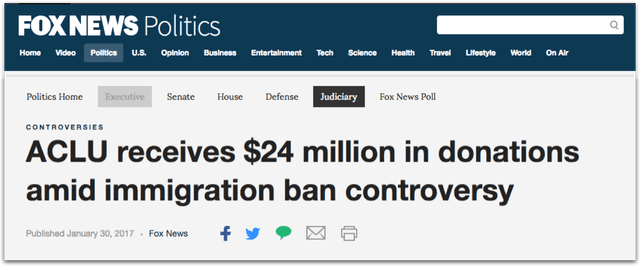
They were too busy doing all this to ask for money, but regardless of that, they raised a lot. On the weekend of 28 January, the ACLU received 24 million dollars online.
Now this is America, and the numbers are always bigger stateside, so let me put that in context for you. The previous annual income from online donations was $4 million dollars. This incredible organisation received six times their previous annual income in one weekend: because they put themselves forwards and were appointed as leaders of the resistance.
Now this story has become part of my fundraising folklore. When I think of that outpouring of compassion and anger it moves me to tears. And when you tell a story so many times, the facts start to get a little blurry, so I've done some fact checking. I ploughed through every tweet from the ACLU from the weekend of that first travel ban and they definitely did not ask for money. Not once.
A world in action
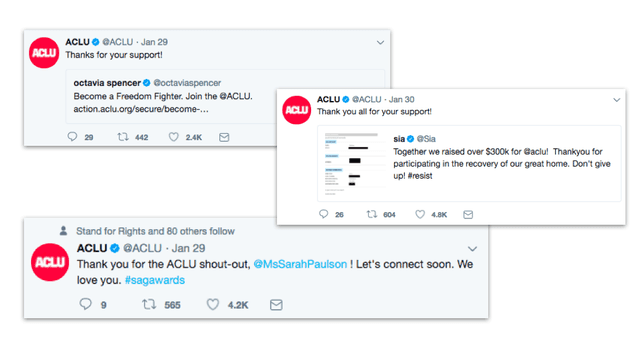
One thing they did, however, was say thank you — a lot. One of the things that inspires me about this story is the ingenuity of it all.
The ingenuity of the ACLU to be on the front foot and ready to go, as the rest of the world looked on aghast as events unfolded in the USA.
And the ingenuity of the thousands of people who took the initiative to donate as an act of resistance, from a Facebook product designer setting up a Facebook fundraiser, which raised over one million dollars, to celebrities promising to match funds and to dog owners buying ACLU swag for their pooches.[Ed: swag for dogs is various types of clothing and other ‘stuff’.]
Every single act was an act of resistance. An act of rebellion.
And when the time came to act, people knew that the ACLU could be counted on, because
they had proved that they were in it for the long haul.
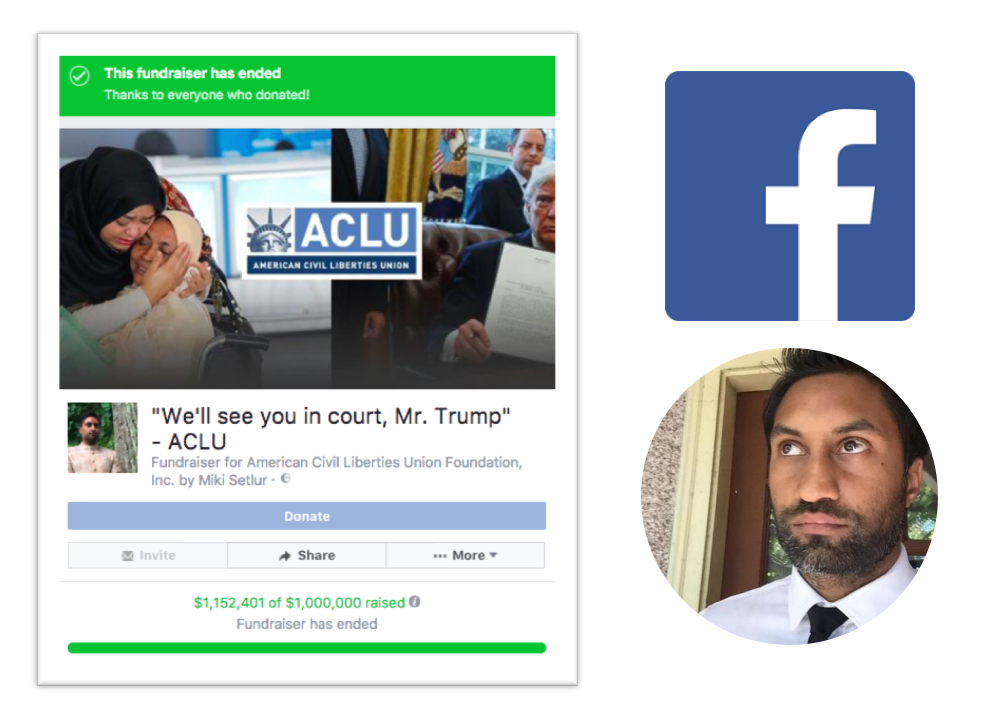
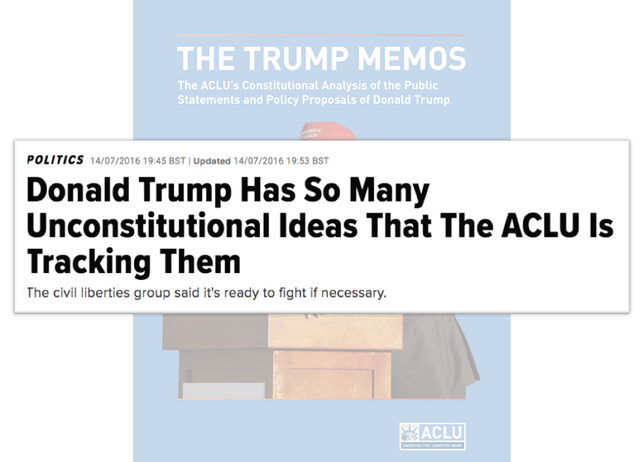
Now you’re possibly thinking, that’s a great story but we don’t have Trump in the UK (thank god) and our charities are a bit more complicated than that. Our cause isn’t that sexy, it’s not so easy to get fired up about. So let me just remind you: they raised $24 million to fund lawyers.
The people behind the ACLU had the bravery to not just
think, but to do, is to put themselves out as leaders of a movement. A resistance. I wish I'd thought of that.
Because so many people in the world need hope, and if our organisations are brave enough to take the big, bold actions that the world needs right now, we can become that hope. A new hope. And in the meantime, while we’re saving the world, we might just raise some money to help pay for it along the way.



